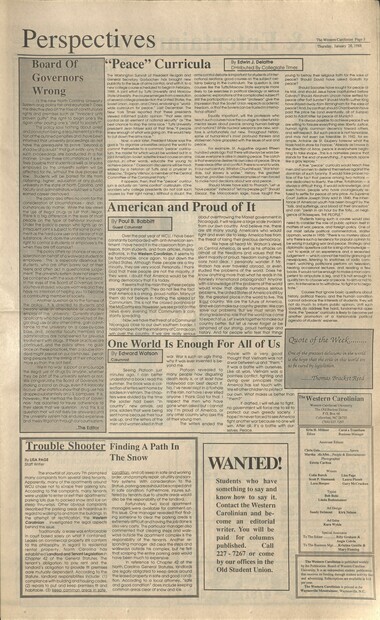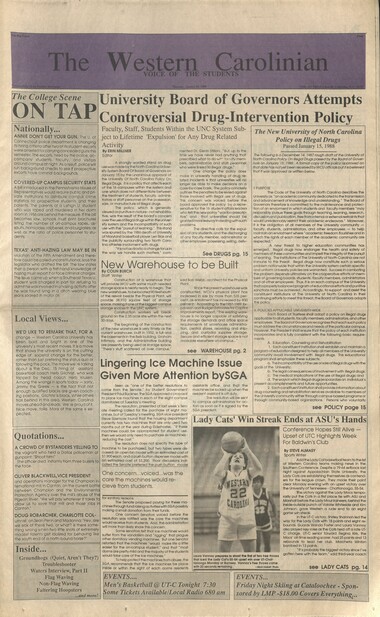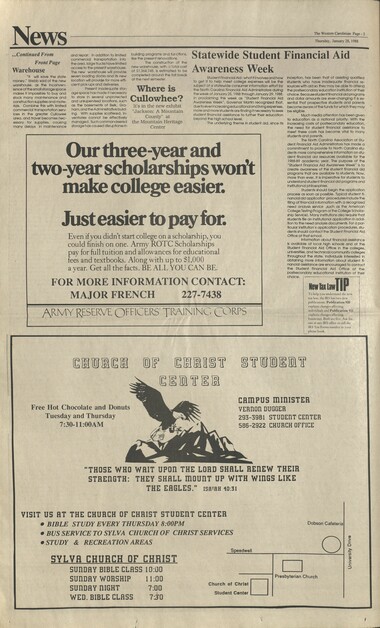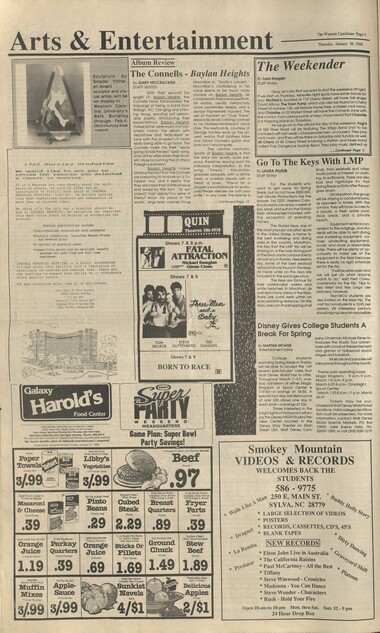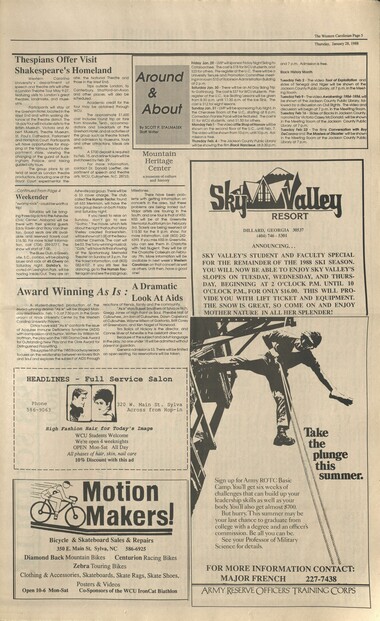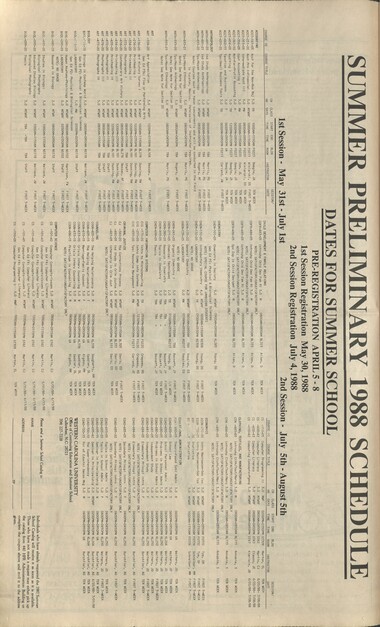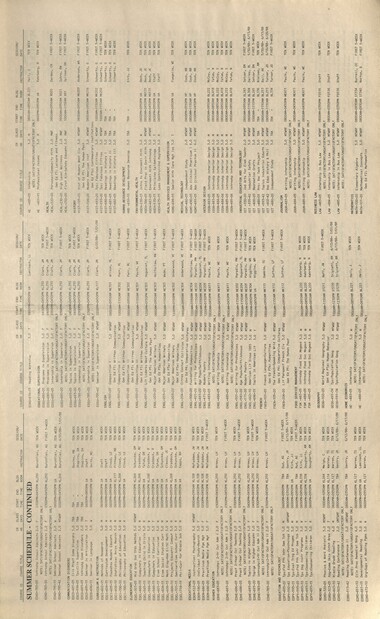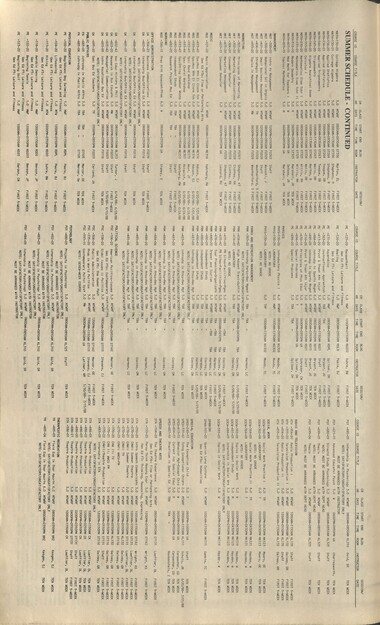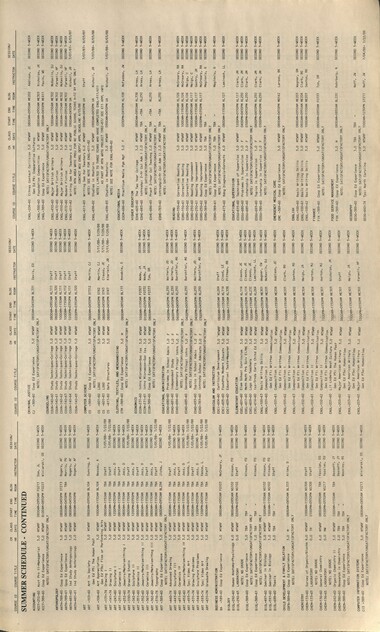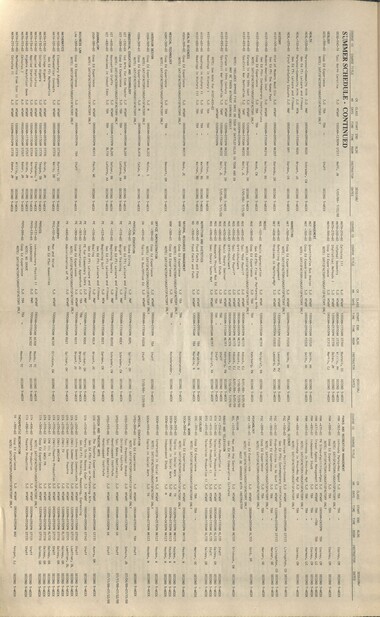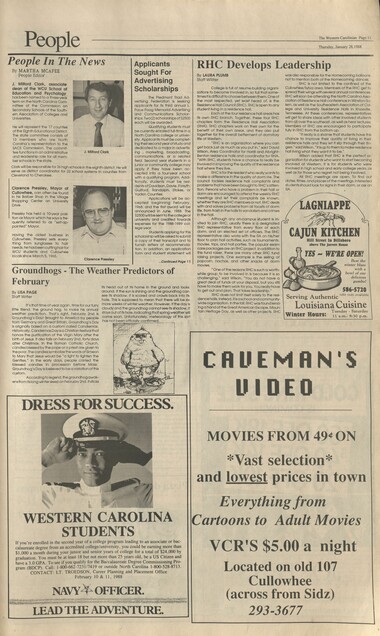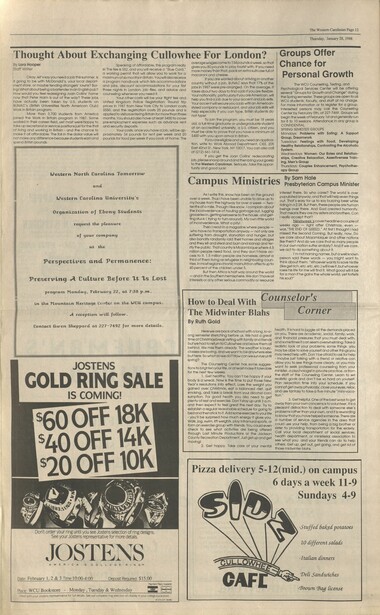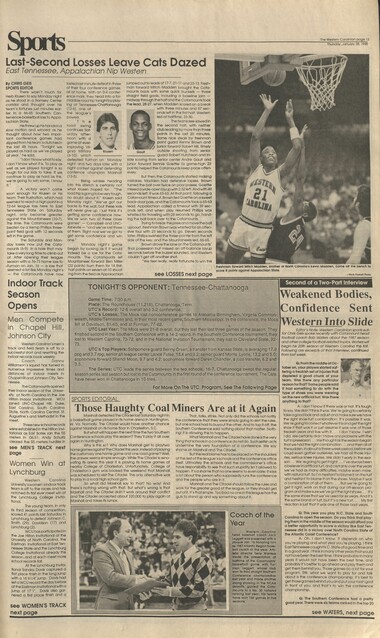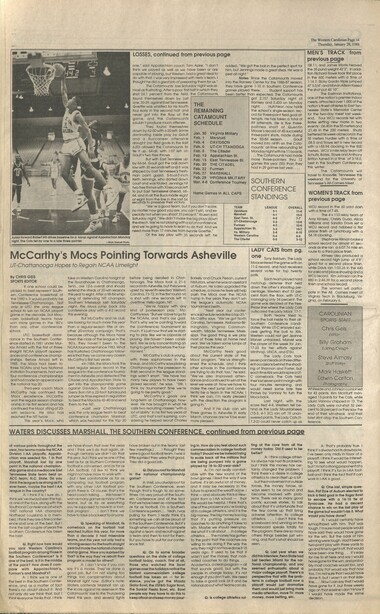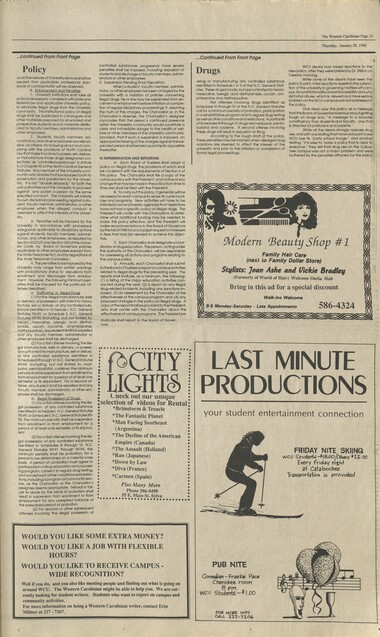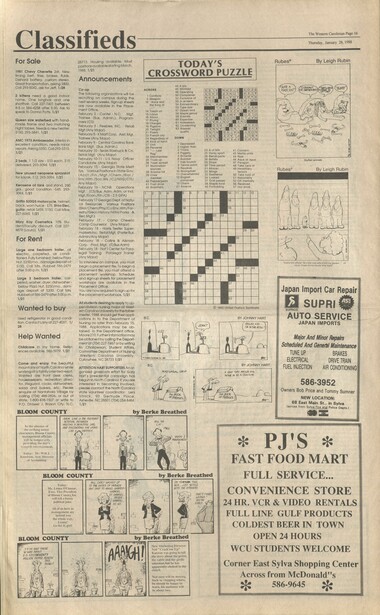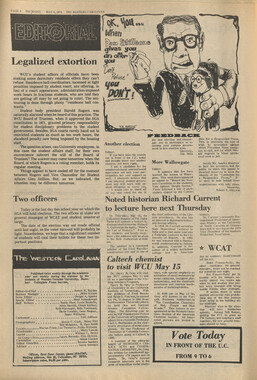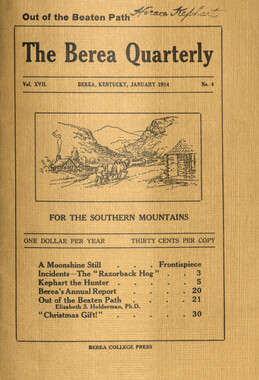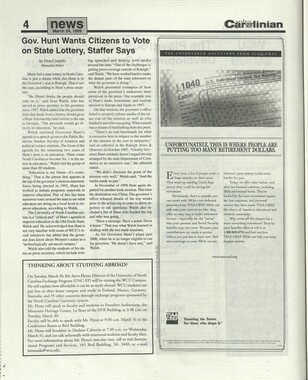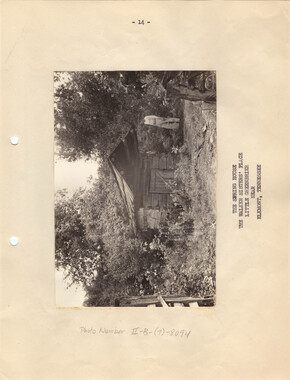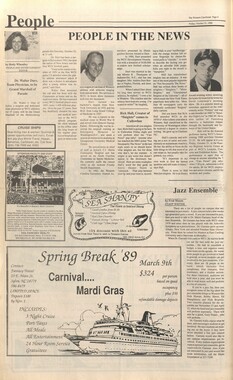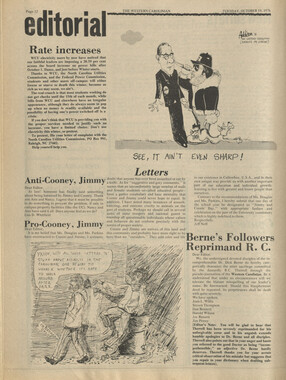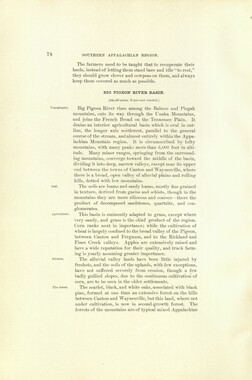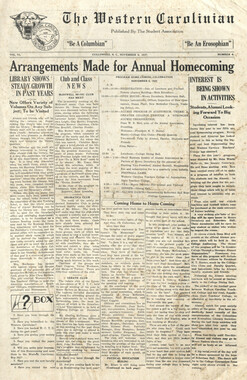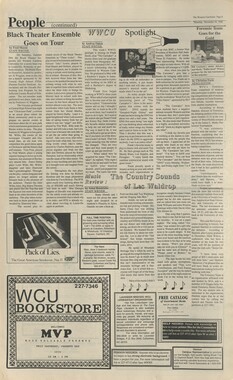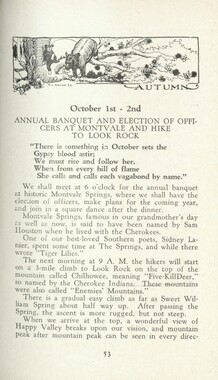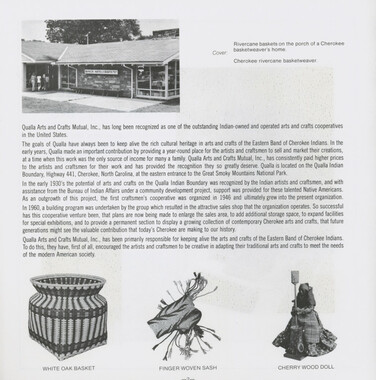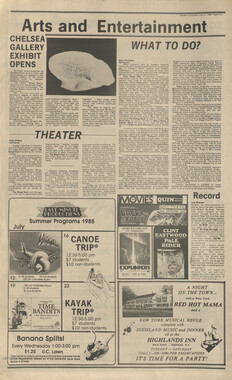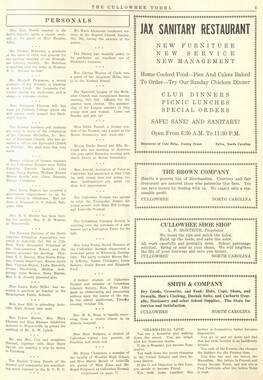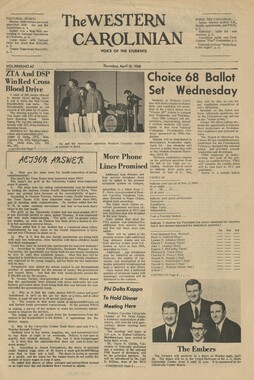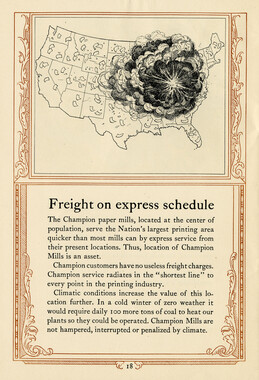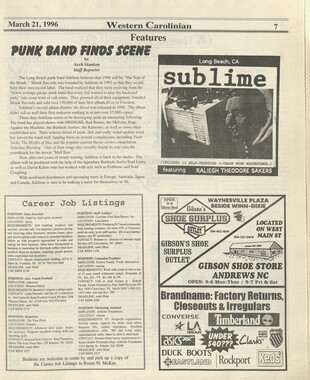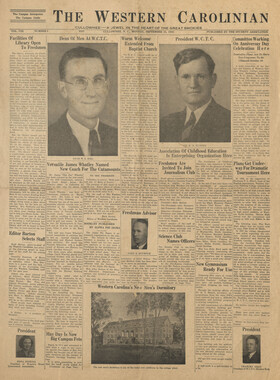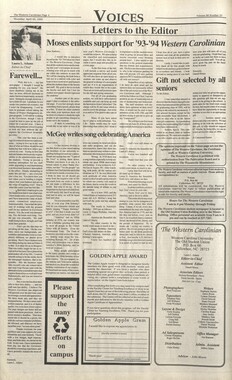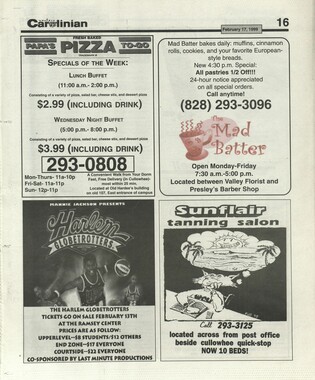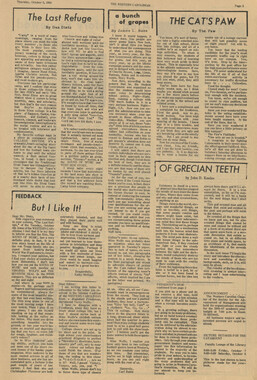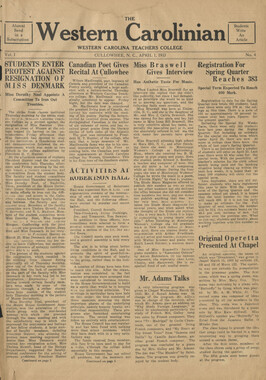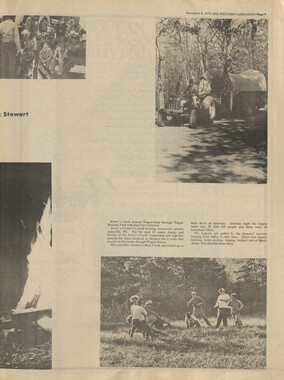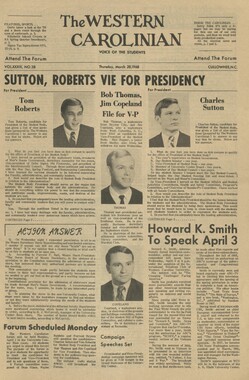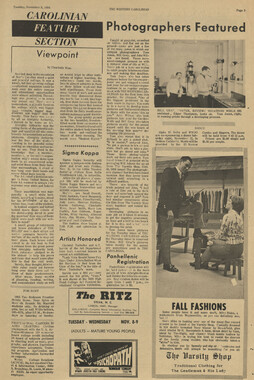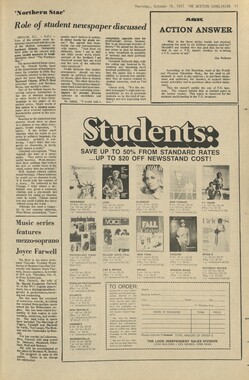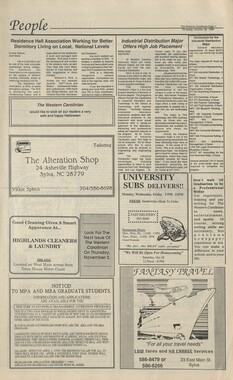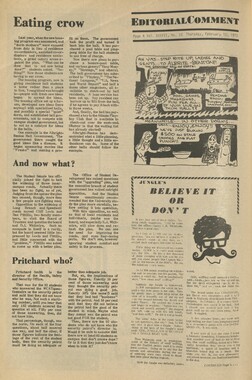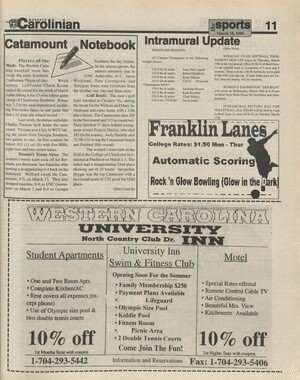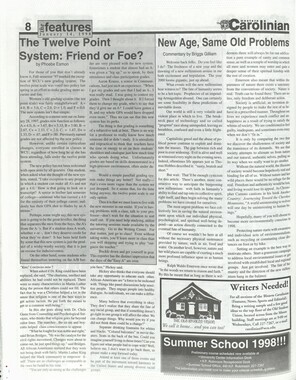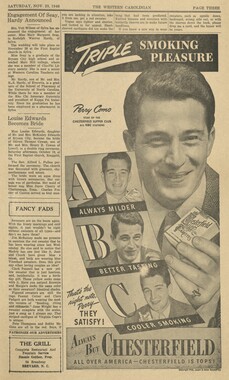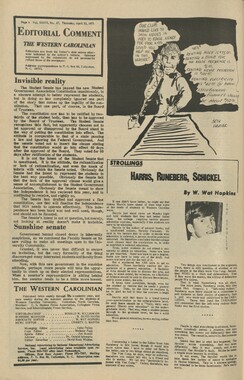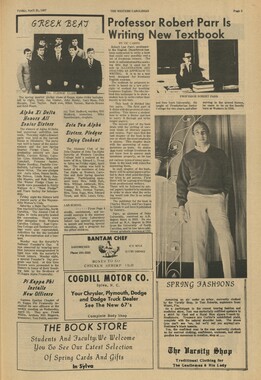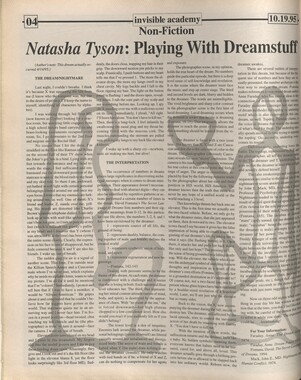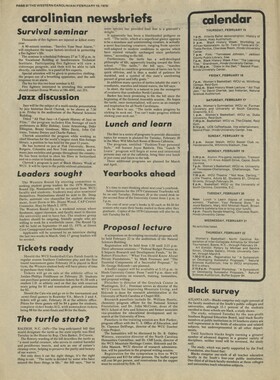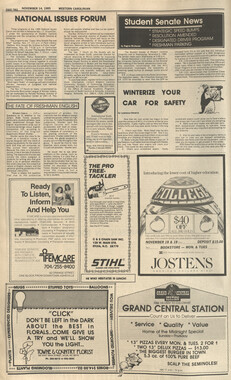Western Carolina University (20)
View all
- Canton Champion Fibre Company (2308)
- Cherokee Traditions (292)
- Civil War in Southern Appalachia (165)
- Craft Revival (1942)
- Great Smoky Mountains - A Park for America (2766)
- Highlights from Western Carolina University (430)
- Horace Kephart (941)
- Journeys Through Jackson (154)
- LGBTQIA+ Archive of Jackson County (85)
- Oral Histories of Western North Carolina (314)
- Picturing Appalachia (6772)
- Stories of Mountain Folk (413)
- Travel Western North Carolina (160)
- Western Carolina University Fine Art Museum Vitreograph Collection (129)
- Western Carolina University Herbarium (92)
- Western Carolina University: Making Memories (708)
- Western Carolina University Publications (2283)
- Western Carolina University Restricted Electronic Theses and Dissertations (146)
- Western North Carolina Regional Maps (71)
- World War II in Southern Appalachia (131)
University of North Carolina Asheville (6)
View all
- Allanstand Cottage Industries (62)
- Appalachian National Park Association (53)
- Bennett, Kelly, 1890-1974 (1388)
- Berry, Walter (76)
- Brasstown Carvers (40)
- Carver, George Washington, 1864?-1943 (26)
- Cathey, Joseph, 1803-1874 (1)
- Champion Fibre Company (233)
- Champion Paper and Fibre Company (297)
- Cherokee Indian Fair Association (16)
- Cherokee Language Program (22)
- Crowe, Amanda (40)
- Edmonston, Thomas Benton, 1842-1907 (7)
- Ensley, A. L. (Abraham Lincoln), 1865-1948 (275)
- Fromer, Irving Rhodes, 1913-1994 (70)
- George Butz (BFS 1907) (46)
- Goodrich, Frances Louisa (120)
- Grant, George Alexander, 1891-1964 (96)
- Heard, Marian Gladys (60)
- Kephart, Calvin, 1883-1969 (15)
- Kephart, Horace, 1862-1931 (313)
- Kephart, Laura, 1862-1954 (39)
- Laney, Gideon Thomas, 1889-1976 (439)
- Masa, George, 1881-1933 (61)
- McElhinney, William Julian, 1896-1953 (44)
- Niggli, Josephina, 1910-1983 (10)
- North Carolina Park Commission (105)
- Osborne, Kezia Stradley (9)
- Owens, Samuel Robert, 1918-1995 (11)
- Penland Weavers and Potters (36)
- Roberts, Vivienne (15)
- Roth, Albert, 1890-1974 (142)
- Schenck, Carl Alwin, 1868-1955 (1)
- Sherrill's Photography Studio (2565)
- Southern Highland Handicraft Guild (127)
- Southern Highlanders, Inc. (71)
- Stalcup, Jesse Bryson (46)
- Stearns, I. K. (213)
- Thompson, James Edward, 1880-1976 (226)
- United States. Indian Arts and Crafts Board (130)
- USFS (683)
- Vance, Zebulon Baird, 1830-1894 (1)
- Weaver, Zebulon, 1872-1948 (58)
- Western Carolina College (230)
- Western Carolina Teachers College (282)
- Western Carolina University (1794)
- Western Carolina University. Mountain Heritage Center (18)
- Whitman, Walt, 1819-1892 (10)
- Wilburn, Hiram Coleman, 1880-1967 (73)
- Williams, Isadora (3)
- Cain, Doreyl Ammons (0)
- Crittenden, Lorraine (0)
- Rhodes, Judy (0)
- Smith, Edward Clark (0)
- Appalachian Region, Southern (2569)
- Asheville (N.C.) (1923)
- Avery County (N.C.) (26)
- Blount County (Tenn.) (161)
- Buncombe County (N.C.) (1672)
- Cherokee County (N.C.) (283)
- Clay County (N.C.) (555)
- Graham County (N.C.) (233)
- Great Smoky Mountains National Park (N.C. and Tenn.) (519)
- Haywood County (N.C.) (3524)
- Henderson County (N.C.) (70)
- Jackson County (N.C.) (4694)
- Knox County (Tenn.) (25)
- Knoxville (Tenn.) (12)
- Lake Santeetlah (N.C.) (10)
- Macon County (N.C.) (420)
- Madison County (N.C.) (212)
- McDowell County (N.C.) (39)
- Mitchell County (N.C.) (132)
- Polk County (N.C.) (35)
- Qualla Boundary (981)
- Rutherford County (N.C.) (76)
- Swain County (N.C.) (2115)
- Transylvania County (N.C.) (270)
- Watauga County (N.C.) (12)
- Waynesville (N.C.) (84)
- Yancey County (N.C.) (72)
- Aerial Photographs (3)
- Aerial Views (60)
- Albums (books) (4)
- Articles (1)
- Artifacts (object Genre) (228)
- Bibliographies (1)
- Biography (general Genre) (2)
- Cards (information Artifacts) (38)
- Clippings (information Artifacts) (191)
- Crafts (art Genres) (622)
- Depictions (visual Works) (21)
- Design Drawings (1)
- Drawings (visual Works) (184)
- Envelopes (73)
- Facsimiles (reproductions) (1)
- Fiction (general Genre) (4)
- Financial Records (12)
- Fliers (printed Matter) (67)
- Glass Plate Negatives (381)
- Guidebooks (2)
- Internegatives (10)
- Interviews (815)
- Land Surveys (102)
- Letters (correspondence) (1013)
- Manuscripts (documents) (618)
- Maps (documents) (177)
- Memorandums (25)
- Minutes (administrative Records) (59)
- Negatives (photographs) (5835)
- Newsletters (1285)
- Newspapers (2)
- Occupation Currency (1)
- Paintings (visual Works) (1)
- Pen And Ink Drawings (1)
- Periodicals (193)
- Personal Narratives (10)
- Photographs (12976)
- Plans (maps) (1)
- Poetry (6)
- Portraits (4533)
- Postcards (329)
- Programs (documents) (151)
- Publications (documents) (2236)
- Questionnaires (65)
- Scrapbooks (282)
- Sheet Music (2)
- Slides (photographs) (402)
- Songs (musical Compositions) (2)
- Sound Recordings (796)
- Specimens (92)
- Speeches (documents) (15)
- Tintypes (photographs) (8)
- Transcripts (322)
- Video Recordings (physical Artifacts) (23)
- Vitreographs (129)
- Text Messages (0)
- A.L. Ensley Collection (275)
- Appalachian Industrial School Records (7)
- Appalachian National Park Association Records (336)
- Axley-Meroney Collection (2)
- Bayard Wootten Photograph Collection (20)
- Bethel Rural Community Organization Collection (7)
- Blumer Collection (5)
- C.W. Slagle Collection (20)
- Canton Area Historical Museum (2110)
- Carlos C. Campbell Collection (282)
- Cataloochee History Project (64)
- Cherokee Studies Collection (4)
- Daisy Dame Photograph Album (5)
- Daniel Boone VI Collection (1)
- Doris Ulmann Photograph Collection (112)
- Elizabeth H. Lasley Collection (1)
- Elizabeth Woolworth Szold Fleharty Collection (4)
- Frank Fry Collection (95)
- George Masa Collection (173)
- Gideon Laney Collection (452)
- Hazel Scarborough Collection (2)
- Hiram C. Wilburn Papers (28)
- Historic Photographs Collection (236)
- Horace Kephart Collection (861)
- Humbard Collection (33)
- Hunter and Weaver Families Collection (1)
- I. D. Blumenthal Collection (4)
- Isadora Williams Collection (4)
- Jesse Bryson Stalcup Collection (47)
- Jim Thompson Collection (224)
- John B. Battle Collection (7)
- John C. Campbell Folk School Records (80)
- John Parris Collection (6)
- Judaculla Rock project (2)
- Kelly Bennett Collection (1407)
- Love Family Papers (11)
- Major Wiley Parris Civil War Letters (3)
- Map Collection (12)
- McFee-Misemer Civil War Letters (34)
- Mountain Heritage Center Collection (4)
- Norburn - Robertson - Thomson Families Collection (44)
- Pauline Hood Collection (7)
- Pre-Guild Collection (2)
- Qualla Arts and Crafts Mutual Collection (12)
- R.A. Romanes Collection (681)
- Rosser H. Taylor Collection (1)
- Samuel Robert Owens Collection (94)
- Sara Madison Collection (144)
- Sherrill Studio Photo Collection (2558)
- Smoky Mountains Hiking Club Collection (616)
- Stories of Mountain Folk - Radio Programs (374)
- The Reporter, Western Carolina University (510)
- Venoy and Elizabeth Reed Collection (16)
- WCU Gender and Sexuality Oral History Project (32)
- WCU Mountain Heritage Center Oral Histories (25)
- WCU Oral History Collection - Mountain People, Mountain Lives (71)
- WCU Students Newspapers Collection (1744)
- Western North Carolina Tomorrow Black Oral History Project (69)
- William Williams Stringfield Collection (2)
- Zebulon Weaver Collection (109)
- African Americans (390)
- Appalachian Trail (35)
- Artisans (521)
- Cherokee art (84)
- Cherokee artists -- North Carolina (10)
- Cherokee language (21)
- Cherokee pottery (101)
- Cherokee women (208)
- Church buildings (170)
- Civilian Conservation Corps (U.S.) (110)
- College student newspapers and periodicals (1830)
- Dams (107)
- Dance (1023)
- Education (222)
- Floods (61)
- Folk music (1015)
- Forced removal, 1813-1903 (2)
- Forest conservation (220)
- Forests and forestry (1184)
- Gender nonconformity (4)
- Great Smoky Mountains National Park (N.C. and Tenn.) (181)
- Hunting (38)
- Landscape photography (25)
- Logging (118)
- Maps (83)
- Mines and mineral resources (8)
- North Carolina -- Maps (18)
- Paper industry (38)
- Postcards (255)
- Pottery (135)
- Railroad trains (71)
- Rural electrification -- North Carolina, Western (3)
- School integration -- Southern States (2)
- Segregation -- North Carolina, Western (5)
- Slavery (5)
- Sports (452)
- Storytelling (244)
- Waterfalls -- Great Smoky Mountains (N.C. and Tenn.) (66)
- Weaving -- Appalachian Region, Southern (280)
- Wood-carving -- Appalachian Region, Southern (328)
- World War, 1939-1945 (173)
Western Carolinian Volume 53 Number 17
Item
Item’s are ‘child’ level descriptions to ‘parent’ objects, (e.g. one page of a whole book).
-
-
1 Perspectives The Western Carolinian Page 3 Thursday, January 28, 1988 Board Of Governors Wrong IS the new North Carolina University System drug polioy fair and equitable? Does this directive step on the toes of constitutional rights and premises such as "Innocent until proven guilty" the right to begin one's life again after paving one's "debt to society?" This policy says nothing about arrest ; and conviction being a requirement for Initiation of the outlined penalties and I have been informed that university proceedings do not have the prerequisite to prove "beyond a shadow of a doubt" that guilt exists - only that .such proceedings are conducted in a fair manner. Underthese circumstances it is entirely possible that students as well as anyone employed by the university system will be affected for life, without the due process of law. Students wilt be barred for life from obtaining higher education at any public university in the state of North Carolina, and faculty and administrators would see a hard- earned career destroyed. The policy also offers no room for the consideration of circumstances * and circumstances do matter, While the taw views the use of Illegal drugs as just that, illegal there is a big difference in the eyes of most people on the type of behavior involved. Under the policy a person who lights up an infrequent joint is subject to the same punishment as the hard core user a nd dealer of that substance. And, does the university have the right to control a students or employee's life when they are off campus? p|M policy offers no chance of recon^ sideration on behalf of a wayward student or employee. This is especially disastrous for students, who are often barely out of their teens and often act in questionable judgement. The university system does not seem to be concerned with the souis of the wayward, in the eyes of the Board of Governors once you have strayed, you are worth less and they have no intentton of helping you to become a contributing member of society. || Another question: as to the fairness of: the policy. It Is directed to students and persons while in attendence or under the employ of the university. Currently student applicants who have been convicted of illegal drug use or any other crime, gain admittance to the university on a case-by-case basis, and potential faculty members and administrators are notscreened for previous : involvment with drugs. If these practices ore continued, and the policy offers no guidance on these practices, then a double standard might prevail on our campuses; penalizing persons for the timing of their infraction more so than the act itself. We In no way support or encourage the illegal use of drugs by anyone, whether they be part of the university system or not. We congratulate the Board of Govenors for making a stand on drugs, even if it ironically occurs after statistics show that drug use has dropped substantially on U.S. campuses. It is, however, the method the Board of Governors has adopted to insure adherence to their (deals that we question. And this is a question that will not likely be answered until ; m& university system has endured expensive and messy litigation through our court system. ..The Editor "Peace" Curricula By Edwin J. Delattre Distributed By Collegiate Times The Washington Summit of President Reagan and General Secretary Gorbachev has brought new publicity to the issue of arms control, and with It, to a new college course scheduled to begin in February, 1988. A joint effort by Tufts University and Moscow State University, the course emerges from a resolution of several college presidents in the United States, the Soviet Union, Japan, and China, endorsing a "worldwide curriculum for peace." Last December, The New York Times reported that these presidents viewed informed public opinion "that sees arms control as an element of national security" as "the best chance to stop the arms race." Tufts University president Jean Mayer said at that time,"If people knew enough of what was going on, this would help to cut down the arms race." Now, a year later, President Mayer says the goal Is "to organize universities around the world to commit themselves to a common 'peace' curriculum, the model for which would be worked out in a joint American-Soviet, satellite linked course on arms control...In other words, educate the young to achieve peace." Classroom discussions will be moderated by a historian at Tufts and a physicist in Moscow, * Evgeny Vilikhov, a member of the Central Committee of the Communist Party." It appears, then, that the "peace" curriculum is actually an "arms control" curriculum, (One wonders why college presidents do not call such courses by their right name.) Without a doubt, the arms control debate is important for students of international relations; good courses on the subject certainly belong In the curriculum. The question is, are courses like the Tufts/Moscow State example more likely to be exercises In political ideology or serious academic explorations of this complicated subject? Will the participation of a Soviet "professor" give the impression that the Soviet Union respects academic freedom, or that the Soviets can be trusted In International affairs? Equally important, will the professors who teach such courses have the courage to raise fundamental issues about peace among human beings and nations? While nuclear weapons are new, warfare is unfortunately not new. Throughout history, some of humankind's most profound thinkers and statesmen have grappled with the Issues of war and peace. For example, St. Augustine argued fifteen hundred years ago that there will always be wars because everyone is alike in desiring peace. The catch is that everyone desires his own idea of peace. Since these ideas differ and conflict, there Is no end to wars. In our own century, Winston Churchill said," War Is horrible, but slavery is worse." History, the greatest teacher, provides countless examples of men forced to make hard decisions about war and peace. Should Moses have said to Pharaoh.'Let us have peace!" instead of "let my people go?" Should Eleazar, the Maccabean sage, have taught the American and Proud of It Over the past year at WCU, I have been constantly bombarded with anti-American sentiment. I have heard it in the classroom from professors, from students, and from articles, mainly editorials, in the Western Carolinian. It seems to be fashionable, once again, to put Oown the United States. Although these people are a tiny minority, they are very vocal. Personally, I thank God that these people are not the majority. If they were, I doubt that America would be the strong democracy that it is today. It seems that the main thing these people are against is strength. They do not like the fact that America is a strong, proud nation. Many of them do not believe in halting the spread of Communism. This is not the crazea paranoia of the McCarthy era. However,we see proof onthe news every evening that Communism is constantly spreading. Now, we have the threat of a Communist Nicaragua close to our own southern border. I hold no hopes that the small army of Contras can win over the country. If we are really serious about overthrowing the Marxist government in Nicaragua, it will require a large scale invasion from our own country. And believe me, there are still many young Americans who would fight and even die to keep America free from the threat of losing their precious democracy. We have all heard Mr. Watson's views on Central America, as well as his attacks on almost all the freedoms and values that the silent majority of proud, freedom loving Americans hold dear. I personally wonder if Mr. Watson has ever traveled abroad, or even studied the problems of the world. Does he know anything more than what he reads in his Amnesty International propaganda? Anyone with a knowledge of the problems of the world would know that despite numerous serious problems, the United States of America is still by far, the greatest place in the world to live. This is pjjr country. We are the future of America, and we can make our country greater. We can solve our problems. But we must retain the strong leadership role that the world has come to expect of us. Let's work togetherto make our country better. But let us never forget or be ashamed of our strong, proud heritage and history. And for people who feel that things young to betray their religious faith for the sake of peace? Should David have asked Goliath for peace? Should Socrates have sought for peace at his trial, and should Jesus have capitulated before Calvary? Should Abraham Lincoln have settled for peace after Fort Sumter? Should Martin Luther King have stayed away from Birmingham for the sake of peace? And, by contrast, should Chamberlain have paid the price he (and eventually, all of Europe) paid to Adolf Hitler for peace at Munich? It Is always possible to achieve peace if we are willing to forsake everything else: liberty, justice, human rights, common decency toward others, and self-respect. But such peace Is not honorable, and may not even be tolerable. In 1942. for example, Antolne de St. Exupery foresaw what the Nazis had In store for France: "Already as I move in the direction of Arras, peace is everywhere beginning to take shape...This Is a nameless peace that stands for the end of everything...It spreads apace like a gray leprosy." A true "peace" curricula would teach free men and women to defend themselves against the dominion of such tyranny. It would take proper notice of the fact that peace among two nations — one dedicated to liberty, the other, totalitarian — is always a difficult thing. It would acknowledge, and even honor, people who have courageously refused to settle for peace at any price. As Supreme Court Justice Joseph Story said in 1840, the inheritance of American youth has been bought by the "toils, and sufferings, and blood of their ancestors" and can "perish in an hour by the folly....or negligence o't'fts keepers, THE PEOPLE." Students taking such a course would also need to consider the role of public opinion itself in matters of war, peace, and foreign policy. One of our most astute political commentators, Walter Lippman, wrote in 1955: "There Is no mystery about why there is such a tendency for popular opinion to be wrong in judging war and peace. Strategic and diplomatic questions call for a king of knowledge — not to speak of an experience and a seasoned judgement — which cannot be had by glancing at newspapers, listening to snatches of radio comment, watching politicians perform on television, hearing occasional lectures, and reading a few books. It would not be enough to make a man competent to amputate a leg, and it Is not enough to qualify him to choose war or peace, to arm or not to arm, to intervene or to withdraw, to fight or to negotiate." Courses that ignore basic questions about history, political theory, and the human condition cannot advance the interests of students: they will not do much to inform public opinion. Until such courses do address the hard, fundamental questions, the "peace" curricula Is Wke/y to become yet another promotion of a fashionable political agenda at students' expense. One World Is Enough For AH of Us ::!g^::E£$!^ :::GoWrnn'&x::::^ Seeing Platoon just minutes ago, I can better understand a book I read this summer. The book was a collection of letters sent home by soldiers in Vietnam. The chapters were divided by the time the soldier had been "in country", new arrivals, old pros, soldiers that were being sent home because their tour was up, and the letters of the men and women killed in that war. War is such an ugly thing, why it was ever invented is beyond me. Platoon revealed to many people how disgusting death really is, or at least how Hollywood can best depict it. No, I've never slept in a foxhole in the rain, nor have I ever killed anyone. I thank God for that. I respect the men who have gone when asked Put I cannot say I'm proud of America, or any other country who asks this of their young men. The writers ended the Quote of the Weef^ movie with a very good thought that Vietnam was not a war between us and "them." It was a battle with ourselves. Like all wars, Vietnam was a pointless conflict, fighting and dying over principles that America has lost touch with. We kill other children to protect our own. What makes us better than "them?" If drafteO, I will refuse to fight, no government will force me to kill to protect our own greedy society. I hope I' m never forced to see America fight another war because no one will win. After all, it's a battle with ourselves. Peace. One of'thegreatest delusions in the worCd is the hope that the evils in this world are to Be cured~fnj Cegistativn. ^mas<Brack$tS&e<£ :j:j$j:j:j:j:]iVEii^^ Trouble Shooter Finding A Path In The Snow By LISA PAGE Staff Writer The snowfall of January 7th prompted many complaints from several area tenants. Apparently, many of the apartments around WCU chose not to scrape their parking lots. According to the complaints, many tenants were unable to enter or exit their apartments' parking lots due to packed snow and ice on steep thru-ways. Other obvious complaints Oescribed the parking areas as hazardous in regard to walking to and from the buildings. In the attempt at rectification, the Western Carolinian investigated the legal aspects behind this issue. Traditionally, a lease was enforceable in court based solely on what it contained. Leases on commercial property still conform to this philosophy. In regard to residential rental property. North Carolina has established Landlord and Tenant Legislation in Chapter 42 of the General Statutes. The tenant's obligation to pay rent and the landlord's obligation to provide fit premises aare mutually dependent. According to the Statute, landlord responsibilities include: (1) compliance with building and housing codes, (2) repairs to put and keep premises fit and habitable, (3) keep common areas in safe condition, and (4) keep in safe and working order, and promptly repair, all utility and sanitary systems. With consideration to the Statue, parking areas should be scraped and in safe condition. Furthermore, injuries suffered by tenants due to unsafe areas would also be the responsibility of the landlord. Fortunately, two local apartment managers were available for comment on this issue. One manager revealed that finding someone to clear the parking areas is extremely difficult and having the job done is also very costly. This particular manager also commented that clearing steps and walkways outside the apartment complex is the responsibility of the tenants. Another responding manager did clear the steps and walkways outside his complex, but he felt that scraping the entire parking area would have been much to expensive. In reference to Chapter 42 of the North Carolina General Statutes, landlords are legally obligated to keep areas around the leased property in safe and good condition. According to a local attorney, "safe and good condition" does include keeping common areas clear of snow and ice. WANTED! Students who have something to say and know how to say it. Contact the Western Carolinian and become an editorial writer. You will be paid for columns published. Call 227 - 7267 or come by our offices in the Old Student Union. Erin H. Millner Editor Carol e Trantham Business Manager Associate Editors Chris Geis Sports Martha McAfee....People & Entertainmnet Photographer Edwin Carlton Writers Colin Burch Scott P. Stamasek Lora Hooper Lisa Page Laura Plumb Gary McCracken Typist Bob Bohl Linda Bodenhamer Ad Design Sandy Delmont Kirk Nelson Ad Sales Kara Wykle Special Assistants To The Editor Billy Graham & Angle Colvin To The Business Mgr Kristina Gentile & Mary Fleming The Western Carolinian is published weekly by the Publication Board of Western Carolina University. It is an independent student publication that receives its funding through student activity fee and advertising. Subscriptions are available at $16 per year. The Western Carolinian is printed at the Waynesville Mountaineer, Waynesville, N.C.
Object
Object’s are ‘parent’ level descriptions to ‘children’ items, (e.g. a book with pages).
-
The Western Carolinian is Western Carolina University's student-run newspaper. The paper was published as the Cullowhee Yodel from 1924 to 1931 before changing its name to The Western Carolinian in 1933.
-
